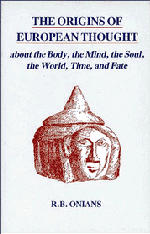Book contents
- Frontmatter
- Contents
- Preface to the first edition
- Preface to the second edition
- Introduction: The Earliest Greeks
- PART I THE MIND AND THE BODY
- PART II THE IMMORTAL SOUL AND THE BODY
- Chapter I The ψυχή
- Chapter II The Genius, Numen, etc.
- Chapter III Anima and Animus
- Chapter IV The Knees
- Chapter V The Strength
- Chapter VI The Stuff of Life
- Chapter VII River-Worship and some Forms of the Life-substance
- Chapter VIII The World: Beginnings of Greek ‘Philosophy’
- Chapter IX Death and Cremation
- Chapter X The Offerings to the Dead and to the Gods
- Chapter XI Nectar and Ambrosia
- PART III FATE AND TIME
- ADDENDA
- Indexes
Chapter IX - Death and Cremation
Published online by Cambridge University Press: 06 August 2010
- Frontmatter
- Contents
- Preface to the first edition
- Preface to the second edition
- Introduction: The Earliest Greeks
- PART I THE MIND AND THE BODY
- PART II THE IMMORTAL SOUL AND THE BODY
- Chapter I The ψυχή
- Chapter II The Genius, Numen, etc.
- Chapter III Anima and Animus
- Chapter IV The Knees
- Chapter V The Strength
- Chapter VI The Stuff of Life
- Chapter VII River-Worship and some Forms of the Life-substance
- Chapter VIII The World: Beginnings of Greek ‘Philosophy’
- Chapter IX Death and Cremation
- Chapter X The Offerings to the Dead and to the Gods
- Chapter XI Nectar and Ambrosia
- PART III FATE AND TIME
- ADDENDA
- Indexes
Summary
So much for life. We have seen that normally the liquid diminishes with the passing of life so as to seem in a sense its measure. What of death? The sweat that comes out of the dying would, like other sweat, seem to be loss of αἰών, but it is unnecessary to suppose that, when the conception was formed, the αἰών was believed to depart completely with the last breath. Soon, very soon in a warm dry climate, as Homer and others observed, the body dries up. Thus, by the great favour of the gods the corpse of Hector was shaded so that the ‘sun should not dry up (σκήλειε) the flesh about the sinews and limbs’, and it is a marvel how twelve days after death he is ‘dewy as if just slain’ (ἐερσήεις, which the scholiast interprets ὑγρότητα ἔχων, οủ κατεσκελετευμένος). Indeed, the dead were for the Greeks pre-eminently ‘dry’. It fits our finding that αἰών, the ‘life’, was the ‘liquid’, that Homer expresses ‘living, alive’ by ‘moist, wet’, διερός. Nausikaa reassures her attendants that Odysseus is not an enemy: ‘That mortal is not διερός and never will be born who shall come with war to the land of the Phaeacians; for very dear are they to the immortals’. Elsewhere for διερὸς βροτός Homer has зωὸς βροτός.
- Type
- Chapter
- Information
- The Origins of European ThoughtAbout the Body, the Mind, the Soul, the World, Time and Fate, pp. 254 - 270Publisher: Cambridge University PressPrint publication year: 1988



